Politics
Culture Will Not Save Us Now
Resistance culture is unlikely to return. Something totally new needs to be created from this wreckage.
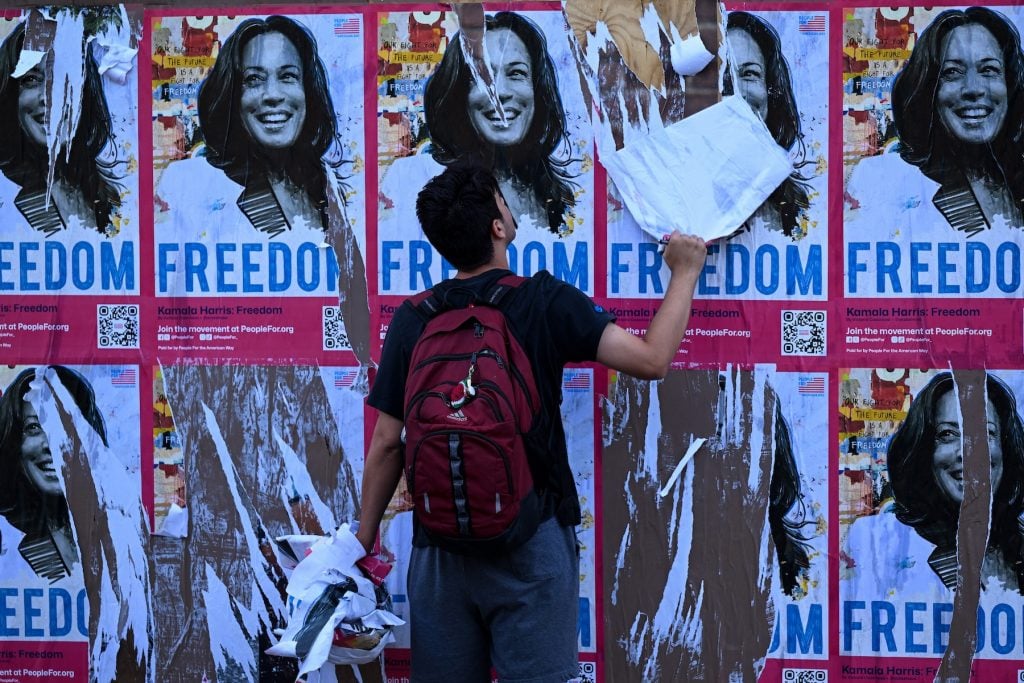
Resistance culture is unlikely to return. Something totally new needs to be created from this wreckage.

Ben Davis

If I had to say something about Donald Trump’s victory to people who are in shock right now, I would say this: You should be mad.
What I see around me is depression. Grief. Despair.
But people should be angry. Specifically, angry at the army of consultants and Democratic Party hacks who took over $1 billion of their money, sent millions of texts, begging, pleading pathetically. They paid themselves well. And then they blew it so badly we’ll pay for it the rest of our lives.
Why are all the political columnists and podcasters so deferential, even when they are diagnosing the obvious, which is that this campaign was a world-historic flop? Why do they say, “Of course, Harris did her best with a bad hand…” etc.? Because they identify with this failing political machine, and they are running cover for it. But you shouldn’t.
You want to see a really bad work of election art? No, you don’t. You probably want to think about anything else, or to cry. But I think it is a work so bad that it might tell you something about this sad, scary election outcome. Here it is.
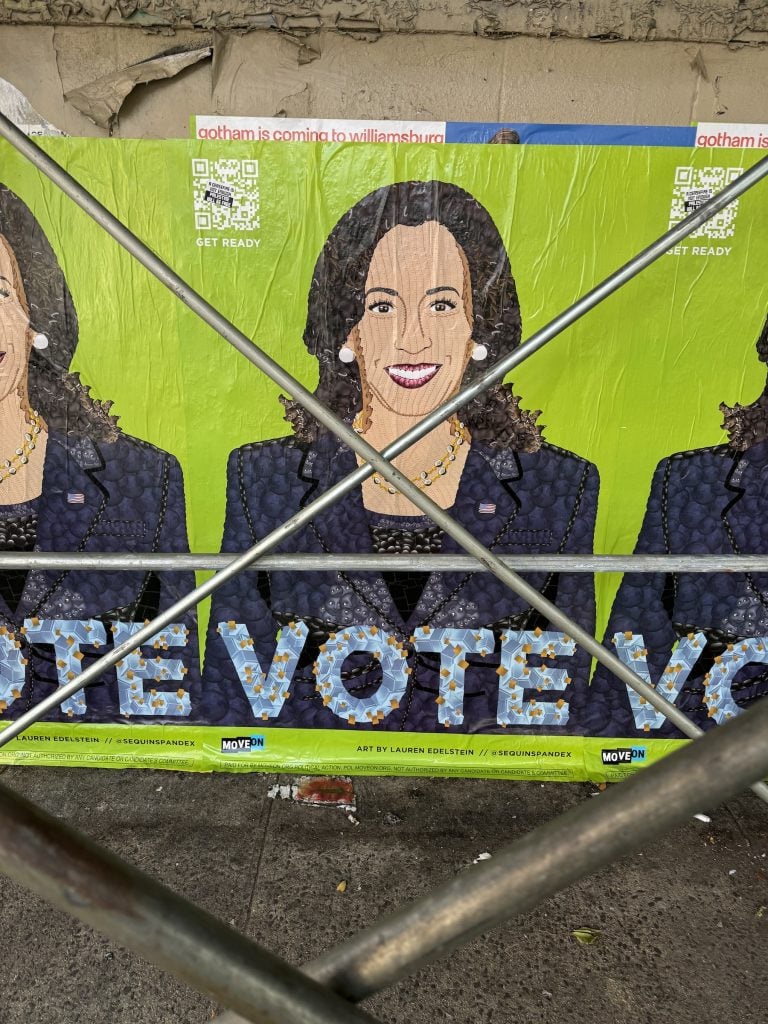
MoveOn.org poster for Kamala Harris in Brooklyn. Photo by Ben Davis.
The posters were paid for by liberal nonprofit MoveOn.org. I happened upon them as it was becoming clearer and clearer that Kamala Harris was having trouble communicating any clear message that distanced herself from her deeply unpopular predecessor, Joe Biden.
Aside from the obvious question (“Why is MoveOn wasting donation money postering Brooklyn?”), the closer I looked at this stiff likeness of Harris, the more perplexed I was about the mindset of the people who commissioned it.
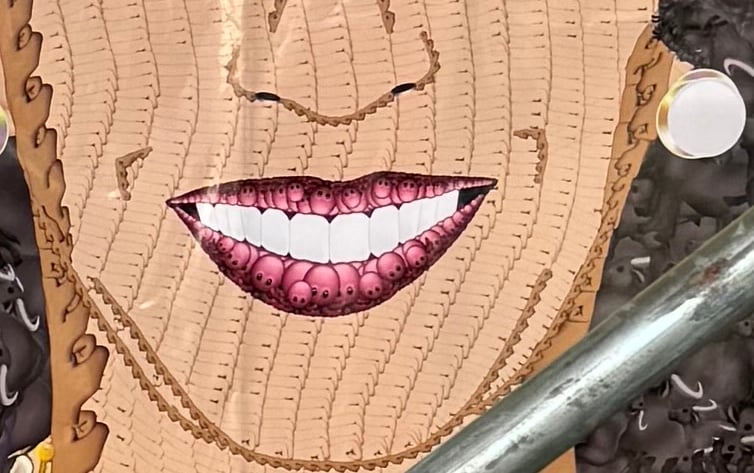
MoveOn.org poster for Kamala Harris in Brooklyn. Photo by Ben Davis.
If you looked closely, it renders her face entirely from emojis. Harris’s eyes are smiley faces. Her skin, fist-bump emojis. Her lips, for some reason, swarms of octopi. The word “VOTE” is made of ballot box emojis. And, of course, her necklace is adorned with coconut emojis.
This is a work of art that says, clearly and proudly, “Look closely and you will see that Kamala Harris’s support is an incoherent mass of internet vibes.” It is worse than Shepard Fairey’s self-plagiarism of his Obama “HOPE” poster, a bad and lifeless Harris likeness with the insipid slogan “FORWARD.” (Forward from what? To where?)
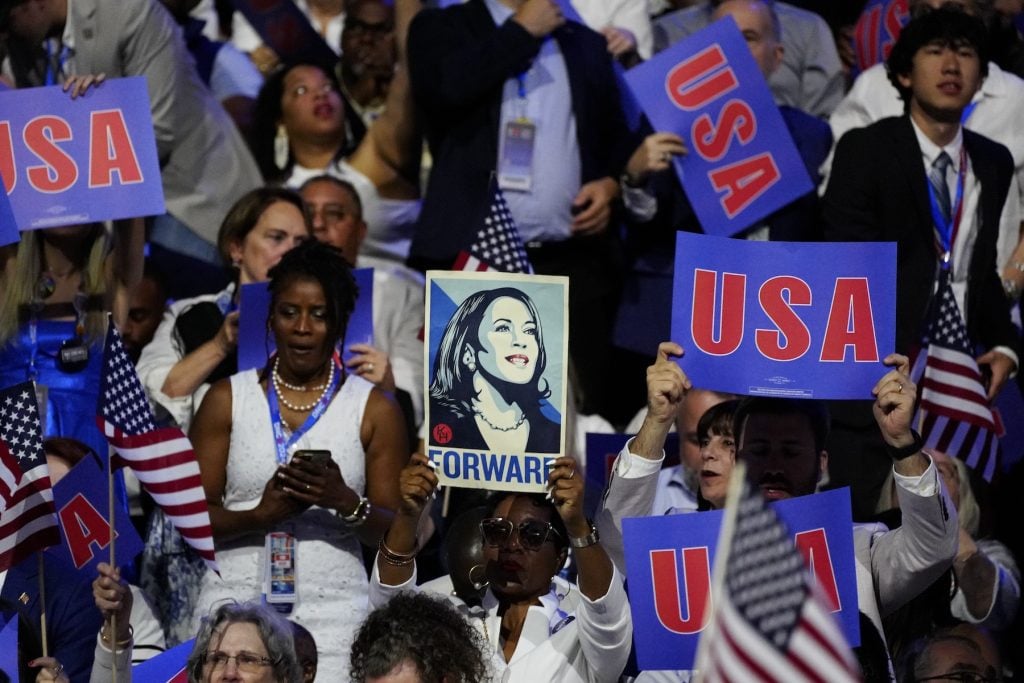
A Kamala Harris poster seen among delegates on day 4 of the Democratic National Convention at the United Center on August 22, 2024 in Chicago, Ill. (Photo by Melina Mara/The Washington Post via Getty Images)
Neither really caught on. Nothing really did after the mirage of “Brat Summer,” which was pounded into self-parody (e.g. cringe “Democracy Is Brat” posters). There was notably less art engagement around this election—probably part burnout from years and years of outrage, part alienation among the most politically active artists over the administration’s unconscionable Gaza policy.
Harris ran a sped-up version of Hillary’s 2016 campaign, based on substance-free memes, wonkish “Opportunity Economy” proposals that no one understood, an emphasis on Trump as a bad and embarrassing man, and an appeal to Liz Cheney Republicans who proved to be nonexistent. Her one clarion issue, reproductive rights, was more than cancelled out by a studied failure to connect with anger about the economy. All the talk about “politics of joy” mistook partisan relief at being done with the decrepit Biden for a broad foundation and made her look out of touch with the churning discontent of the U.S. public.
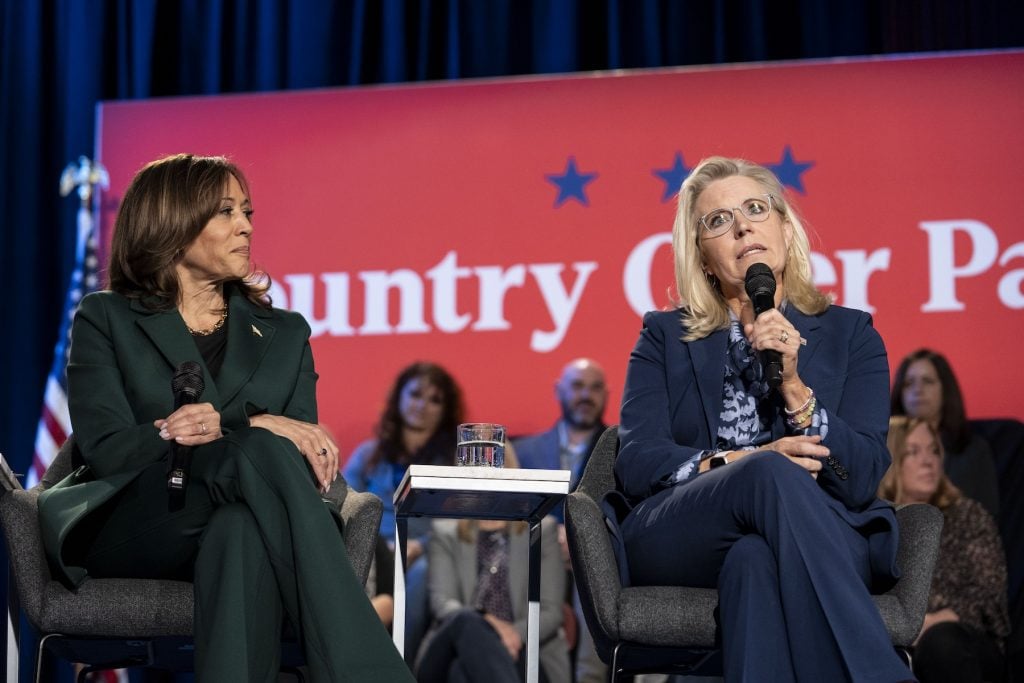
Former U.S. Rep. Liz Cheney speaks during a town hall with Democratic presidential nominee, Vice President Kamala Harris, at the Royal Oak Music Theatre on October 21, 2024 in Royal Oak, Michigan.(Photo by Sarah Rice/Getty Images)
“Against normalization” was once a rallying cry against Trump. In retrospect, this was actually the wrong way to think about things. It would be great if he had been normalized, because then he would be associated with a status quo that vast swaths of the public hate for good reasons. Instead, constantly emphasizing how extraordinary Trump was made him seem appealing and even countercultural, even though he’d been in office. (Bernie Sanders, tragically, has let himself be normalized, diluting his effectiveness to speak to outsider anger.)
Well, I’m just some guy. What do I know? The polls were impossibly tight. I doubt even Trump officials really knew, until the end, the scale of their correct gamble. But expressing anger at the direction of the country, and a hunger for big change, was clearly effective.
Who knows what the reaction in the streets will be, when Trump starts to implement an agenda that I guarantee will be unpopular in practice with many people who voted for him?
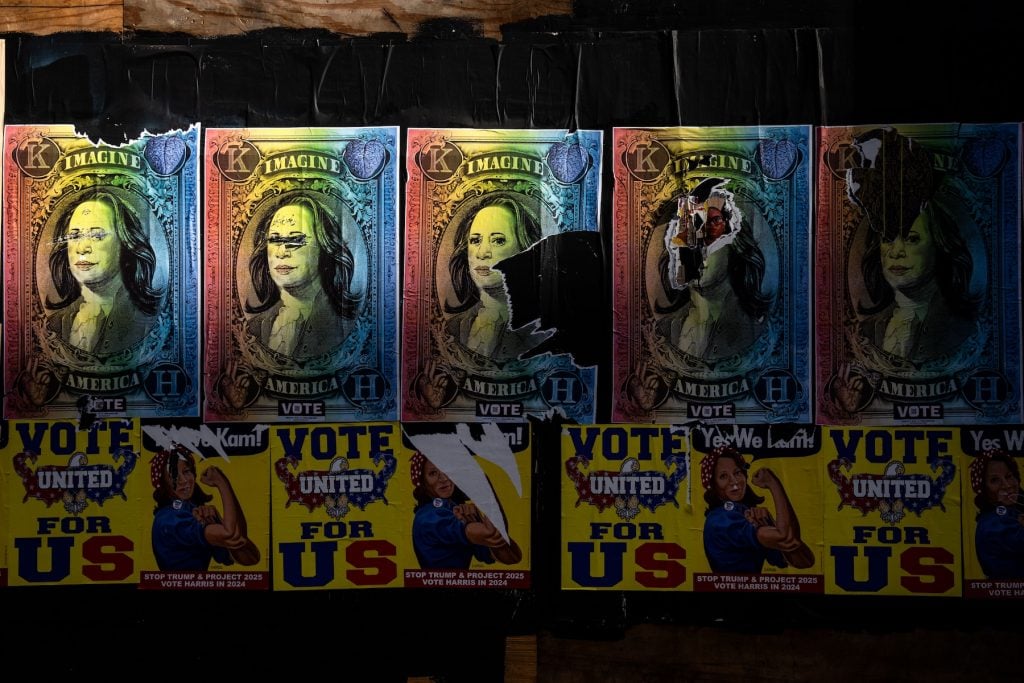
Posters campaigning for Democratic presidential nominee, U.S. Vice President Kamala Harris are seen on a wall along twelfth street on November 4, 2024 in Philadelphia, Pennsylvania. (Kent Nishimura/Getty Images)
But right now, it doesn’t feel like there will be any return of #Resistance-style protest, partly because Trump won so decisively and expanded his coalition so dramatically. On social media there’s a tone of inward-looking mourning, wounded and stunned. On the Media host Micah Loewinger says that there is unlikely to be any significant new “Trump bump” for liberal publications, because people are burned out and disillusioned.
The institutions that are bases of establishment liberalism—academia, journalism, and culture—are already in various states of decay, and it won’t take much of a shock to further break them. Meanwhile, there is now a robust parallel world of popular far-right culture that has moved sharply into the center of the conversation.
I’d expect in the near term for many people to tune out, disengage, shun politics, retreat into Netflix, carpet bomb their minds with drugs, adopt more and more desperately blissed-out spiritual practices… Anything to stop thinking about reality, really, Not saying that’s what I advocate, just that, realistically, that’s what I expect.
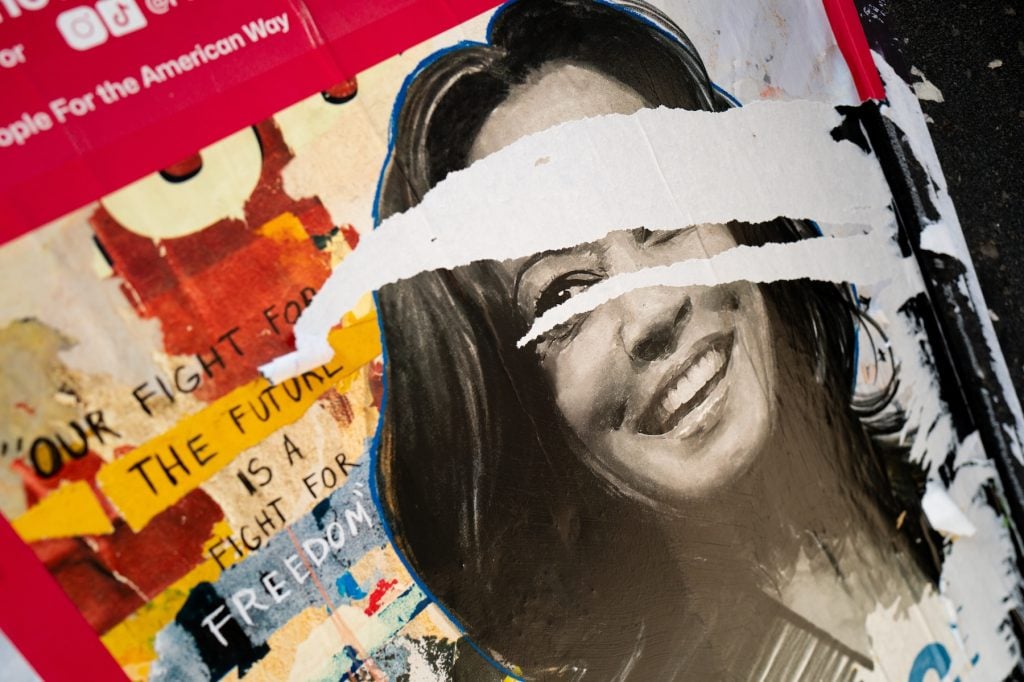
Posters of Democratic presidential candidate, U.S. Vice President Kamala Harris are plastered on a wall in downtown during the first day of the Democratic National Convention (DNC) on August 19, 2024 in Chicago, Illinois. (Photo by Brandon Bell/Getty Images)
That’s because people are suffering a narrative shock. The story that they had in their heads to make sense of the world has collapsed. It is similar in nature to the shock after Biden melted down onstage at the debate—very alarming on its own, but absolutely traumatic because right up until that moment, many influential voices had insisted that Biden’s mental unfitness was Republican propaganda, that he was about to school Trump. Because that was a more comforting story, a better product to sell.
Now, it’s not just that Donald Trump has triumphed. It’s that the entire Biden-era attempt to disqualify him technically over his crimes and his lies and January 6 prevented a reckoning with Trump’s actual very real popularity in 2020, when he actually did get a really massive popular vote total despite losing (and lying about losing). Focusing so much emotional energy just on emphasizing that he must be too weird, too criminal, to be acceptable to “mainstream” America—and then suddenly having to face the reality that actually he’s way more mainstream than his critics themselves… this is a stunning shock. Some people will never recover.
And we should be angry about the paid, professional political storytellers who got the plot that wrong. Save yourself from depression. That suffocating, helpless feeling is partly them whispering to you, “there was nothing we could have done” so that nothing will change. Say clearly out loud to yourself, “These people are failures. This politics has failed.”
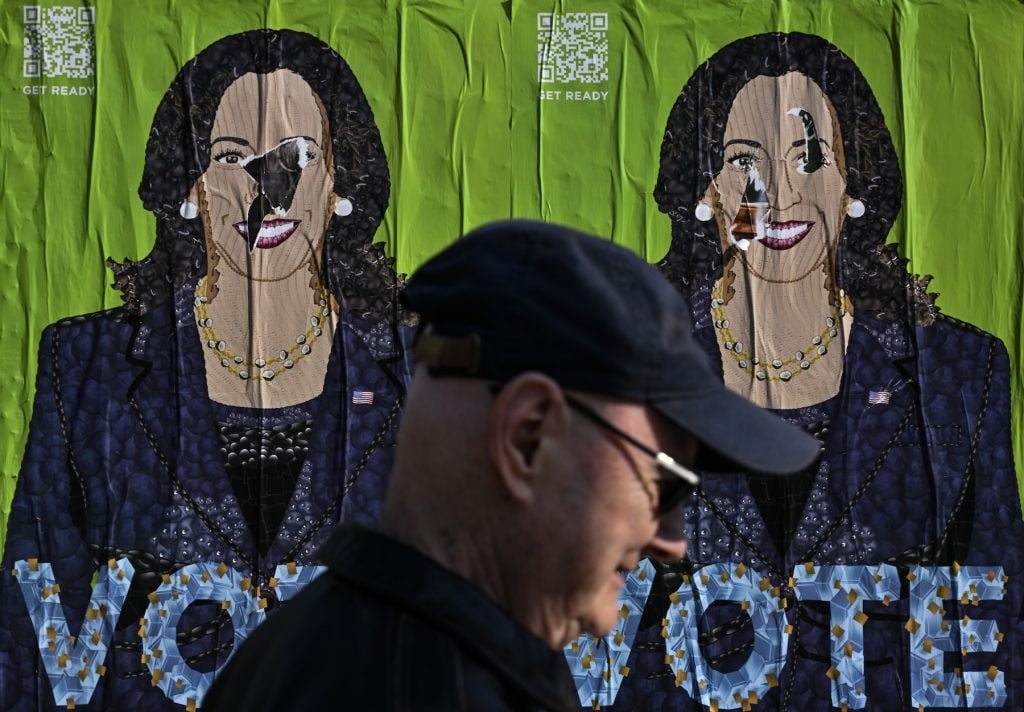
A pedestrian passes by a Kamala Harris Vote poster along a sidewalk on October 12, 2024 in Philadelphia, Pa. (Photo by Ricky Carioti/The Washington Post)
In the miserable post-election torpor, you see some people passing around the same Toni Morrison quote that got passed around after the 2016 loss: “This is precisely the time when artists go to work,” it reads. “There is no time for despair, no place for self-pity, no need for silence, no room for fear. We speak, we write… That is how civilizations heal.”
It actually comes from an essay by Morrison written for the anniversary of The Nation in 2015, touting its tradition of “disruptive, probing, intelligent essays sharing wide space equally with art criticism, reviews, poetry and drama.” Taken abstractly, the sentiment has its merits as consolation. The problem is that our recent era’s particular mix of politics and culture has not proved too helpful for civilizational healing. Clearly.
Read Morrison’s essay to the end, where she says, “Like failure, chaos contains information that can lead to knowledge—even wisdom.” Then ask what wisdom needs to be extracted from this chaos that could prevent whatever culture that comes out of it from once again contributing to a cycle of self-delusion. Personally, I think Morrison’s quote is best paired with another from Horkheimer and Adorno in Dialectic of Enlightenment (1947), on how fascism took hold: “The educated made it easier for barbarians everywhere by being so stupid.”